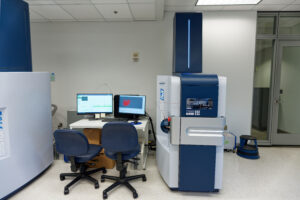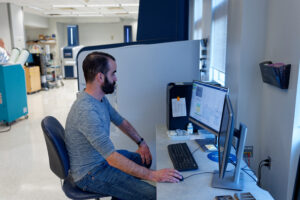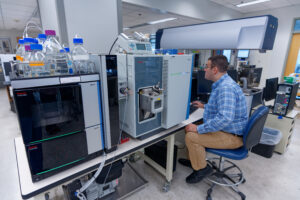Mission
Mass Spectrometry Core

The Mass Spectrometry (small molecule) Core provides collaboration, consultation, and equipment to research investigators throughout the University. The Mass Spectrometry Research and Development Lab continues to provide the Medical Center with cutting-edge instrumentation and methods, including close collaborations with clinicians through translational research. The most recent undertaking of the MSRC is the establishment of the Tissue Profiling/Imaging Laboratory to provide expertise in molecular analysis of tissues and biological fluids. The mission of this Core is to provide expertise for the analysis of complex proteomes of tissue and biofluid samples to provide information that can facilitate the detection of disease states, responses to therapy and drug toxicity. Proteome profiling identifies mass spectral patterns derived from multiple proteins in a tissue or biofluid sample. Proteome imaging can be done by analyzing mass spectral data acquired across a grid within a tissue section. The Tissue/Serum Proteomics Core laboratory provides direct proteome profiling and protein imaging of intact tissues by MALDI-MS. The Core also  provides proteome profiling of serum, plasma and other biofluids by MALDI-MS and analysis of biofluid proteomefractions by “shotgun” LC-MS-MS methods. Proteomic patterns can be analyzed with bioinformatics and biostatistical methods to identify sets of diagnostic spectral markers. Identification of the proteins and protein fragments that account for biomarker signals is done in collaboration with the Proteomics Core Laboratory. There is now in place a Bioinformatics section of the MSRC to address the growing biocomputational needs of the MSRC for mining data. Because of the huge data load generated in the facility, we have begun to implement system to run complex and time-consuming programs for correlation mass spectral data with clinical data, as well as archive and search data.
provides proteome profiling of serum, plasma and other biofluids by MALDI-MS and analysis of biofluid proteomefractions by “shotgun” LC-MS-MS methods. Proteomic patterns can be analyzed with bioinformatics and biostatistical methods to identify sets of diagnostic spectral markers. Identification of the proteins and protein fragments that account for biomarker signals is done in collaboration with the Proteomics Core Laboratory. There is now in place a Bioinformatics section of the MSRC to address the growing biocomputational needs of the MSRC for mining data. Because of the huge data load generated in the facility, we have begun to implement system to run complex and time-consuming programs for correlation mass spectral data with clinical data, as well as archive and search data.
Collaborative Research
The MSRC conducts collaborative research programs with investigators in nearly every Center and department in the Medical Center as well as many trans-Institutional initiatives in the Departments of Chemistry, Physics & Astronomy, Biological Sciences and Electrical Engineering & Computer Science. Other areas include: Pharmacology, Medicine, Cell & Developmental Biology, Anesthesiology, Psychiatry, Molecular Physiology & Biophysics, Infectious Diseases, Pediatrics, Orthopedics, Hematology/Oncology, Microbiology and Immunology, Surgical Urology, Otolaryngology, Allergy/Pulmonary, Surgical Sciences, Biochemistry, Radiation Oncology, Clinical Pharmacology, Gastroenterology, Pathology, Nephrology, and

Cardiovascular Medicine, Structural Biology, Institute for Molecular Neuroscience, Vanderbilt Ingram Cancer Center (VICC), Digestive Disease Research Center, General Clinical Research Center, Clinical Nutrition Research Unit, and the Molecular Toxicology Research Center. Over 200 investigators currently use the facilities, most as an on-going part of their research programs. In particular, the Proteomics Core facility plays major roles not only in the Cancer Center (VICC), but also in the three funded SPORES (GI, Lung and Breast). It is also a major part of the facilities available to the newly formed Chemical Biology Instituteand has many collaborative arrangements with faculty members at the Meharry Medical College.
In addition, contracts to Vanderbilt University for research in drug metabolism include the most prestigious pharmaceutical companies, including Merck, Roche, Novartis, Lilly, and Schering-Plough. The basic goal of most of these projects is the measurement of the site of arrival of a drug, a measure of its relative metabolism, and its effect on the protein concentrations at the site of arrival as compared to other areas.